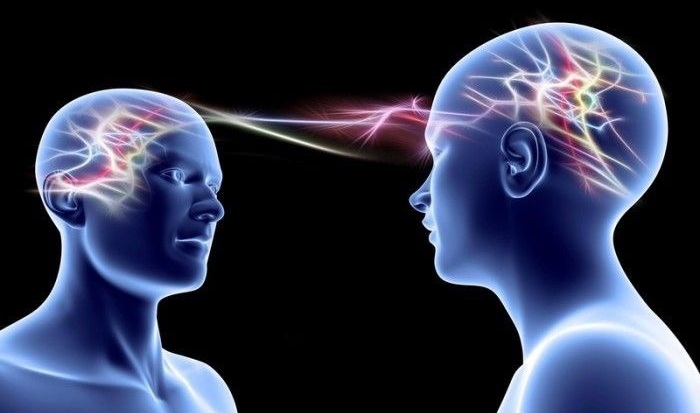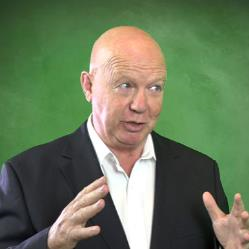 "Your buyer can pick up your intent before you open your mouth" - interview by John Smibert.
"Your buyer can pick up your intent before you open your mouth" - interview by John Smibert.
I learnt something today that is critical for salespeople to be aware of and to prepare for.
In recent few years we have learnt more about the brain and it's capabilities than in all of history. Much of this is directly applicable to how we sell and how our customer perceives us. what I learnt today is particularly so.
 Ian J Lowe has made a study of the brain as it relates to sales. In my recent discussions with him we learnt about the three brains we all have and what impact that has when we sell. Ian mentioned Mirror Neurons in those discussions.So today I ask Ian what impact mirror neurons have on the way we interact with our customer.
Ian J Lowe has made a study of the brain as it relates to sales. In my recent discussions with him we learnt about the three brains we all have and what impact that has when we sell. Ian mentioned Mirror Neurons in those discussions.So today I ask Ian what impact mirror neurons have on the way we interact with our customer.
What he said sent shivers down my spine. Without knowing it buyers use their mirror neurons to sense our intent before we open our mouths. If our intent is not authentically committed on the customer they will know immediately they lay eyes on us - if not before. It made me think of sales meetings I have had where the customer switched off immediately the meeting started and there was no way I could resurrect it. I now have a better idea of what might have happened and what I need to do to avoid this.
Read or view the full discussion below to learn how to leverage the buyer's mirror neurons and not fight them. I recommend it for CEO's, COO's HR, Sales leaders, as well as professional salespeople.
**********
Ian is the CEO of Eccoh.co (formally Go-Givers Australia). He is an expert in sales transformation and a specialist in why people sell.
Interview
John: Delighted to have Ian Lowe with me again - welcome, Ian!
Ian: Great to be here, John!
John: Hey Ian, we talked a lot earlier about the science of selling, and we got into neuroscience and so on. I'd like to talk more about that. I've heard you talk about mirror neurons and things like that.
Ian: Mirror neurons, yes.
John: Tell me more, and how we can use that science to better sell.
Ian: There are some truly fascinating insights that are coming out of the world of neuroscience on a regular basis now. I'll share one that I discovered recently. It was a study into top gun, top gun fighter pilots.
John: Oh yes, the fighter pilots - yes, yes.
Ian: That's right. You know, Tom Cruise, Maverick and Goose.
John: Yes, yes.
Ian: They're doing the remake, you know? I think Tom Cruise is in it, I'm going to go see it. But these are people who are operating at the very edge of the human performance envelope already, these are the top of the top. But even within that group there's an elite who seem to be able to take it to an even higher level.
 John: How?
John: How?
Ian: That's a good question. These people seem to have some sort of precognitive ability; they know, seem to know at least, ahead of time when to go faster, when to go slower, when to turn left or right, when to fire, when to do this, when to do that.
John: Even when something hasn't happened to indicate they need to?
Ian: Even when something hasn't happened.
John: Forecasting the future.
Ian: That's right. This is remarkable stuff, it sends a chill down the spine almost, right? They did some research on this, to try to figure out what's going on, is this something that happens with everybody. So, they got a bunch of people - normal people, like me and you - strapped into these machines, and mapped the body's reaction to certain stimulus. One stimulus, it's random stimulus, it was a picture designed to shock, to create a chemical reaction in the body, and another picture designed to create no reaction really, just a calm picture. And what they found was that the body's reaction to these pictures followed a path; the shocking one, the body's reaction went up in this sort of chemical reaction, and the other one, when it was a calm picture, the body's reaction went down. But the interesting thing was that the body's reaction that preceded the picture actually coming on the screen.
John: Now shivers are going down my spine!
 Ian: Isn't that strange? So, this is completely random, they had no way of knowing what was going to come next, but the body seemed to know, and it was preparing itself, before the shocking picture came up.
Ian: Isn't that strange? So, this is completely random, they had no way of knowing what was going to come next, but the body seemed to know, and it was preparing itself, before the shocking picture came up.
John: Okay. This sounds really interesting, but we're talking to a sales audience. What does that mean to us?
Ian: What that means to us is when you're in a meeting with a client, they can tell, they can pick up from the energies, from the mirror neurons - this is powerful science, powerful - they can pick up from you what your intent really is, before you even maybe know it yourself! So, being crystal clear about your intent, and operating in a way that's congruent with your intent is so critical.
John: It is, isn't it?
Ian: So critical!
John: I can look back, and I remember times when I walked in, started a meeting, and suddenly I knew that I'd lost the customer.
Ian: Yes.
John: It was obviously in some body language I've done, or something.
Ian: Yes, yes.
John: The neurons, the mirror neurons, have just had him switch off.
Ian: That's right, that's right. Don't leave it to chance, your intent will show up, whether you want it to or not. Be crystal clear about it before you get there. [laughs]
John: I talk a lot about this, helping people build a personal brand, particularly in the digital world. Their intent has to be pure, their being has to be authentic, and the way they portray themselves. Because even without opening their mouth, if they're trying to pretend they're somebody different to what they are, people pick it up straight away. Even on the Internet, even on social media.
Ian: Yes, yes. And even if the other person doesn't verbalise it, they can sense it, and there's going to be something that says to them "This isn't feeling good - I'm going to back away."
John: So, we have to get that intent right, and the intent has got to be focused on the other person, and really believe in the fact that we're here to create value for that person, to help that person and give to that person.
Ian: Yes. And we need to understand that by doing so we're not martyring ourselves.
John: Of course not.
Ian: We're not putting our own needs out of the window, we're still in the business of being successful ourselves. But the more we behave in a way that's congruent with our intent, the more we behave in a way that's focused on the other person, the more successful we'll be.
John: And if our intent, our true intent is not toward that customer's, more "I need to get an order, I need to get revenue, etc." then our behaviour will reflect that. The neurons will see it very quickly, even if it's nothing seen.
Ian: No matter how skilled you think you are at hiding it, it's going to show up.
John: Ian, great information. Sometimes it worries me a little bit how we use it and manage it, but it's certainly giving me a very clear message, and our intent is something we've got to get right.
Ian: Fantastic, John - my intent is to come here again sometime and do some more videos with you!
John: [laughs] Thanks, Ian - look forward to it!
Ian: Cheers, John!
John: Bye!
****************
More short interviews with Ian Lowe:
***************

Your Invitation: I invite you to join the Sales Leader Forum group on LinkedIn where you can experience informative discussions with your peers and sales thought leaders on subjects like the one we have discussed here. I also invite you to subscribe to the
- Sales Leader Resource Centre here
- Sales Leader YouTube channel here (300+ sales leadership videos)
Please Share: If you valued this article, please share via your Twitter, LinkedIn, Google+ and Facebook social media platforms. I encourage you to join the conversation or ask questions. So feel free to add a comment on this post - I promise to respond. If inclined please follow my LinkedIn post page here.
Want to touch base? If you have questions please feel free to contact me - email: john.smibert(at)salesleaderforums.com, Phone: +61 404857893 or Skype: john.smibert